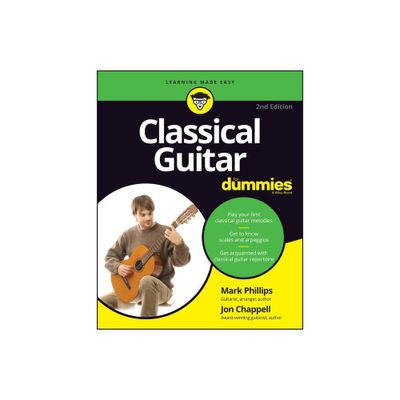Home
John Williams: Changing the Culture of the Classical Guitar: Performance, perception, education and construction / Edition 1
Loading Inventory...
Barnes and Noble
John Williams: Changing the Culture of the Classical Guitar: Performance, perception, education and construction / Edition 1
Current price: $180.00


Barnes and Noble
John Williams: Changing the Culture of the Classical Guitar: Performance, perception, education and construction / Edition 1
Current price: $180.00
Loading Inventory...
Size: OS
*Product Information may vary - to confirm product availability, pricing, and additional information please contact Barnes and Noble
This book assesses the influence and reception of many different forms of guitar playing upon the classical guitar and more specifically through the prism of John Williams.
Beginning with an examination of Andrés Segovia and his influence upon Williams’ life’s work, a further three incisive chapters cover key areas such as performance, perception, education and construction, considering social and cultural contexts of the guitar over the past century. A final chapter on new directions in classical guitar examines the change in reception of the instrument from the mid-1970s to the present day, and Williams’ impact upon what might be termed ‘standard classical guitar repertoire’.
With in-depth discussion of the cultural and perceptual impact of Williams’ more daring crossover projects and numerous musical examples, this is an informative reference for all classical guitar practitioners, as well as scholars and researchers of guitar studies, reception studies, cultural musicology and performance studies. An online lecture by the author and a transcript of the author’s interview with John Williams are also available as e-resources.
Beginning with an examination of Andrés Segovia and his influence upon Williams’ life’s work, a further three incisive chapters cover key areas such as performance, perception, education and construction, considering social and cultural contexts of the guitar over the past century. A final chapter on new directions in classical guitar examines the change in reception of the instrument from the mid-1970s to the present day, and Williams’ impact upon what might be termed ‘standard classical guitar repertoire’.
With in-depth discussion of the cultural and perceptual impact of Williams’ more daring crossover projects and numerous musical examples, this is an informative reference for all classical guitar practitioners, as well as scholars and researchers of guitar studies, reception studies, cultural musicology and performance studies. An online lecture by the author and a transcript of the author’s interview with John Williams are also available as e-resources.


















